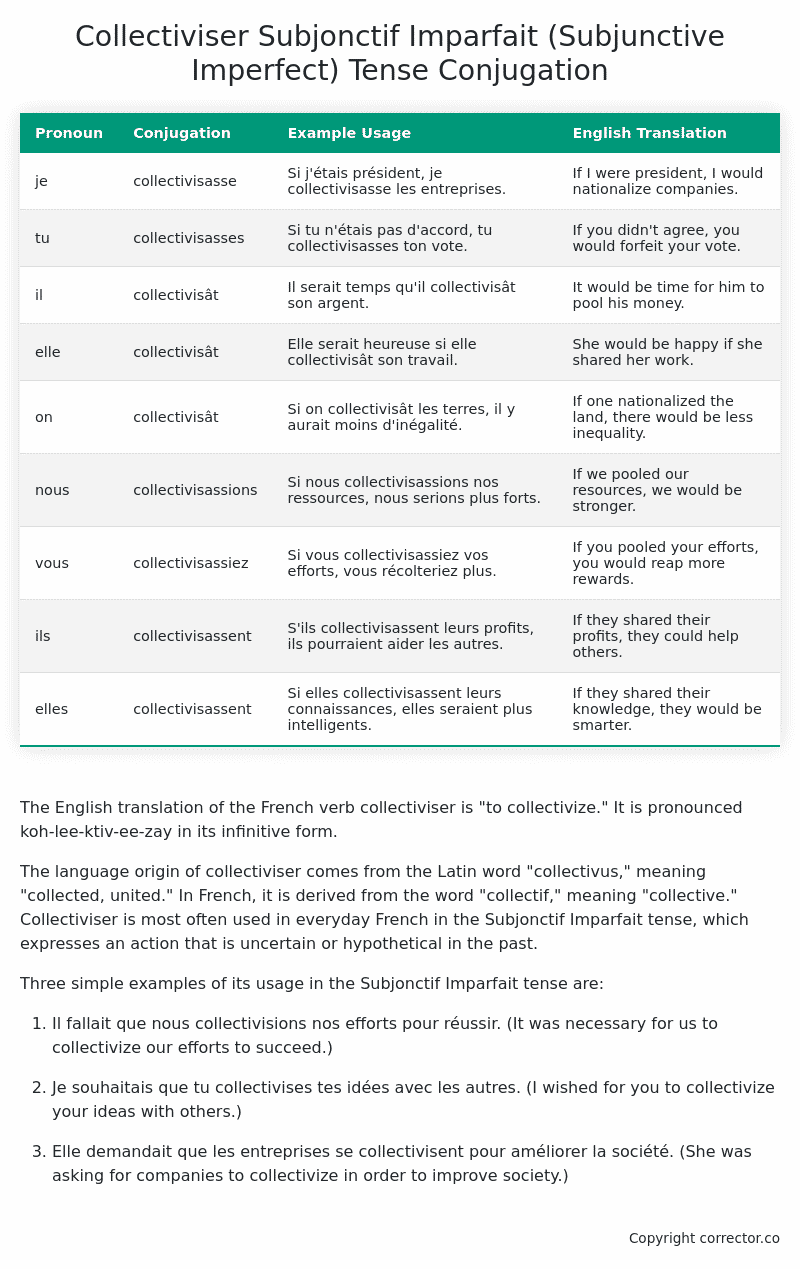Subjonctif Imparfait (Subjunctive Imperfect) Tense Conjugation of the French Verb collectiviser
Introduction to the verb collectiviser
The English translation of the French verb collectiviser is “to collectivize.” It is pronounced koh-lee-ktiv-ee-zay in its infinitive form.
The language origin of collectiviser comes from the Latin word “collectivus,” meaning “collected, united.” In French, it is derived from the word “collectif,” meaning “collective.” Collectiviser is most often used in everyday French in the Subjonctif Imparfait tense, which expresses an action that is uncertain or hypothetical in the past.
Three simple examples of its usage in the Subjonctif Imparfait tense are:
-
Il fallait que nous collectivisions nos efforts pour réussir. (It was necessary for us to collectivize our efforts to succeed.)
-
Je souhaitais que tu collectivises tes idées avec les autres. (I wished for you to collectivize your ideas with others.)
-
Elle demandait que les entreprises se collectivisent pour améliorer la société. (She was asking for companies to collectivize in order to improve society.)
Table of the Subjonctif Imparfait (Subjunctive Imperfect) Tense Conjugation of collectiviser
| Pronoun | Conjugation | Example Usage | English Translation |
|---|---|---|---|
| je | collectivisasse | Si j’étais président, je collectivisasse les entreprises. | If I were president, I would nationalize companies. |
| tu | collectivisasses | Si tu n’étais pas d’accord, tu collectivisasses ton vote. | If you didn’t agree, you would forfeit your vote. |
| il | collectivisât | Il serait temps qu’il collectivisât son argent. | It would be time for him to pool his money. |
| elle | collectivisât | Elle serait heureuse si elle collectivisât son travail. | She would be happy if she shared her work. |
| on | collectivisât | Si on collectivisât les terres, il y aurait moins d’inégalité. | If one nationalized the land, there would be less inequality. |
| nous | collectivisassions | Si nous collectivisassions nos ressources, nous serions plus forts. | If we pooled our resources, we would be stronger. |
| vous | collectivisassiez | Si vous collectivisassiez vos efforts, vous récolteriez plus. | If you pooled your efforts, you would reap more rewards. |
| ils | collectivisassent | S’ils collectivisassent leurs profits, ils pourraient aider les autres. | If they shared their profits, they could help others. |
| elles | collectivisassent | Si elles collectivisassent leurs connaissances, elles seraient plus intelligents. | If they shared their knowledge, they would be smarter. |
Other Conjugations for Collectiviser.
Le Present (Present Tense) Conjugation of the French Verb collectiviser
Imparfait (Imperfect) Tense Conjugation of the French Verb collectiviser
Passé Simple (Simple Past) Tense Conjugation of the French Verb collectiviser
Passé Composé (Present Perfect) Tense Conjugation of the French Verb collectiviser
Futur Simple (Simple Future) Tense Conjugation of the French Verb collectiviser
Futur Proche (Near Future) Tense Conjugation of the French Verb collectiviser
Plus-que-parfait (Pluperfect) Tense Conjugation of the French Verb collectiviser
Passé Antérieur (Past Anterior) Tense Conjugation of the French Verb collectiviser
Futur Antérieur (Future Anterior) Tense Conjugation of the French Verb collectiviser
Subjonctif Présent (Subjunctive Present) Tense Conjugation of the French Verb collectiviser
Subjonctif Passé (Subjunctive Past) Tense Conjugation of the French Verb collectiviser
Subjonctif Imparfait (Subjunctive Imperfect) Tense Conjugation of the French Verb collectiviser (this article)
Conditionnel Présent (Conditional Present) Tense Conjugation of the French Verb collectiviser
Conditionnel Passé (Conditional Past) Tense Conjugation of the French Verb collectiviser
L’impératif Présent (Imperative Present) Tense Conjugation of the French Verb collectiviser
L’infinitif Présent (Infinitive Present) Tense Conjugation of the French Verb collectiviser
Struggling with French verbs or the language in general? Why not use our free French Grammar Checker – no registration required!
Get a FREE Download Study Sheet of this Conjugation 🔥
Simply right click the image below, click “save image” and get your free reference for the collectiviser Subjonctif Imparfait tense conjugation!

Collectiviser – About the French Subjonctif Imparfait (Subjunctive Imperfect) Tense
Formation
Common Everyday Usage Patterns
Interactions with Other Tenses
Subjonctif Présent
Indicatif Passé Composé
Conditional
Conditional Perfect
Summary
I hope you enjoyed this article on the verb collectiviser. Still in a learning mood? Check out another TOTALLY random French verb conjugation!


